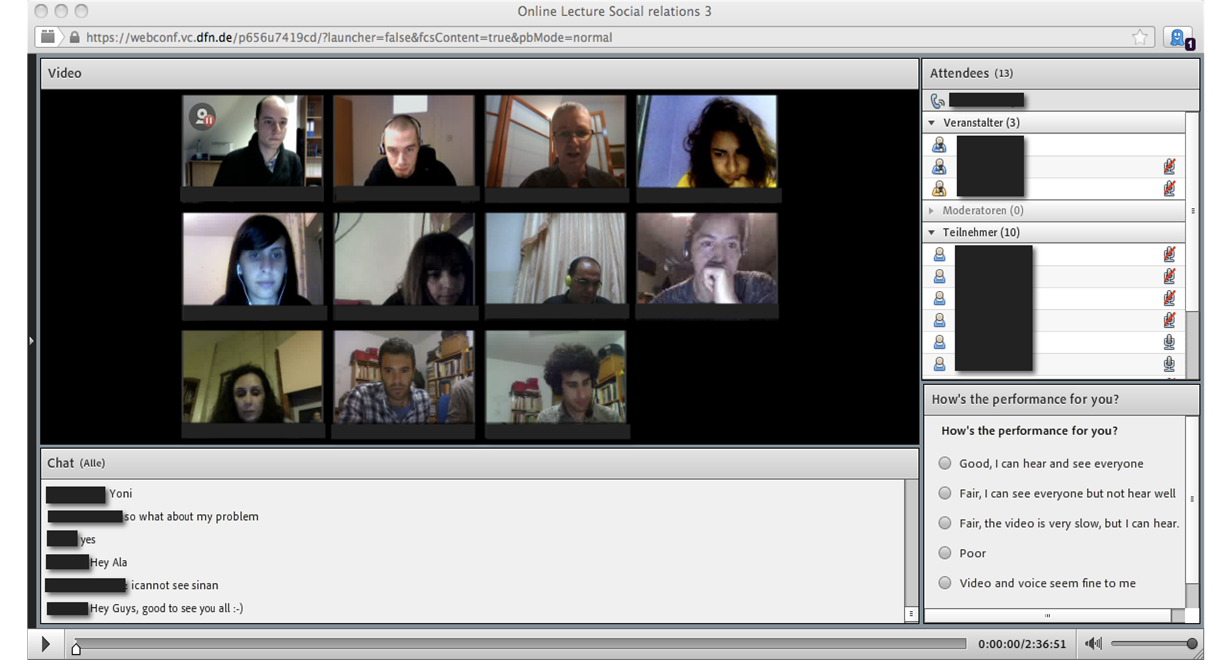Course
| Course type | Online sessions |
| No. of participants | In the winter semester of 2013/14 13 participants from different countries (seven time zones) took part in the online seminars. |
| Duration | The online seminars took place twice a week. For every online session a duration of three and a half hours was planned. |
Tools
- Adobe Connect with the following pods: questions and answers, video, chat, document sharing, recording, polls, web links
- The LMS Moodle (material, communication, linking online rooms, screencast with information and links to lecture recordings)
- A wiki for the supervision of the master's thesis
Realization
At the start of the semester both the students as well as the lecturers were trained in how to use the tools implemented. Especially for Adobe Connect the goal of the training course is not only the technical introduction but also the reduction of reservations and anxieties.
The dates for the online sessions are already set at the start of the semester. When selecting the dates the time zone differences in the countries of the students' residencies are taken into account. Students and lecturers click on the link of the respective session in order to meet up in the virtual Adobe Connect room. The contents and agenda of the online sessions vary according to the type of course it is and can contain the following elements: Lecture, presentation, discussion, polls. Thereby the technical possibilities of the virtual room are used: questions and answers (protocol of the questions posed during the session), video, chat, file sharing, recordings, polls. A colleague who works for the degree program hosts and supervises the online sessions. The colleague provides both technical as well as organizational support and produces a live recording.
At the end of every online session the recording of the session is posted on the LMS where the students can look at it anytime. A forum is available for the discussions outside of the online sessions. In addition, for group work there are always two open Adobe Connect "lounges" available.
Illustration 1: Online seminar in the Adobe Connect room
Experiences made by the lecturer
The lecturers and students are very satisfied with the implementation of Adobe Connect. The easy integration of videos, powerpoint and pdf files is highly valued. However, the quality of the recordings was not very good (the picture and the audio files were partially asynchronous). Due to this an alternative recording solution was used, this being the software Wirecast.
The duration of the online sessions (4 hours) was definitely too long and confirmed as such. The participants' span of attention wavered so that quite a few commented: "Online teaching is a lot more strenuous than face-to-face teaching". Therefore the teaching concept should take into account the specialties of online communication and collaboration. In comparison to a face-to-face course the attention span of the students sinks a lot faster and the danger of being distracted is much higher. The duration of the online sessions was adjusted to three hours and regular breaks were also included.
The lecturers also missed the non-verbal feedback of the students (body language, mimicry). This can be compensated by requiring alternative forms of feedback (written, oral or through micro-feedback).
Even though the online sessions mostly took place without a glitch, the remote technical support was a bit of a challenge for those sporadic moments when technical difficulties cropped up. With the help of e-mail communication, skype and remote desktop connections using both Adobe Connect as well as external software most of the problems could be solved. What occurred most was the "lock-up" of camera and microphone by other applications (e.g. Skype) as well as having to manage low levels of bandwidth and a high latency level. In order to keep the support costs to a minimum on a long-term basis, short screencasts (30 to 90 seconds) were produced for the most common problems that for example demonstrated the possible sources of camera lock-ups or the possibility of pausing individual video streams. Getting the students used to the online teaching environment took about 6 to 7 months.
Further information
- Website of the degree course
- Overview of the blended learning structure of the degree course
- Prezi with information on the design and structure of the study course
- Self-learning module on the FU wiki
- FAQs on the FU wikis
- with a description of implementation scenarios, usage of pods and didactic pointers
- Video guideline on how to set up the audio assistant in Adobe Connect
Support offered by CeDiS
- Consulting services for the implementation of digital solutions in teaching: The Center for Digital Systems (CeDiS) has extensive experience of many years when it comes to the implementation of digital media and systems within the fields of teaching, learning and research. We offer a wide variety of consulting services on the implementation of these tools and systems within the entire academic scope and especially at Freie Universität Berlin.
- Training courses and workshops: For lecturers at Freie Universität Berlin (professors, employees, tutors) as well as lecturers of other universities CeDiS offers training courses and workshops on the topic of teaching and learning with digital media. These course enable participants to implement online elements within their own sphere of teaching.
- The Executive Board of the Freie Universität supports e-learning initiatives: With the e-learning funding program financial resources are provided to lecturers that enrich and improve their courses quality-wise by implementing technological and media-related support. All of the academic staff teaching, the lecturers or even the institutions of the Freie Universität - without the Charité-Universitätsmedizin - can be supported within this program.
